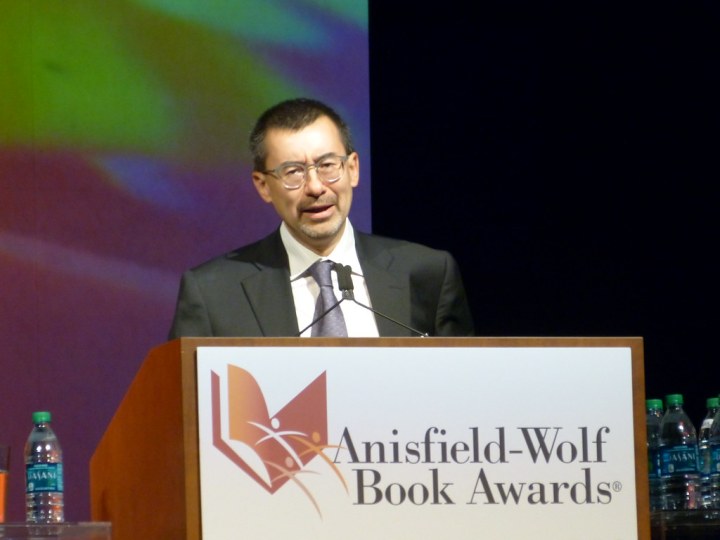On September 7, 2017, I was able to attend the awards ceremony for the Anisfield-Wolf Book Awards in Cleveland.
Â
“Cleveland poet and philanthropist Edith Anisfield Wolf established the book prizes in 1935, in honor of her father, John Anisfield, and husband, Eugene Wolf, to reflect her family’s passion for issues of social justice. Today it remains the only American book prize focusing on works that address racism and diversity. “
The list of winners by year is an excellent reading list for understanding the history of diversity in literature in the United States.
The winners this year were absolutely amazing. I was especially glad to get to hear these speakers.
The chair of the jury is Henry Louis Gates, Jr. I love to watch all his documentaries.
The ceremony started with young Cleveland poet Con-Yai Smith powerfully reciting her poem “Cheetah.”
Poetry – Tyehimba Jess for Olio
Tyehimba Jess is the first African-American man to win the Pulitzer Prize for poetry. In his award acceptance speech he imagined what it must have felt like to own nothing but the words that come out of your mouth as a slave. Is that why spirituals and African-American music is so powerful?
Fiction – Peter Ho Davies for The Fortunes
The Fortunes is about four points of Asian-American experience in the United States from the building of the western railroads until today. Peter Ho Davies is British but has lived in the U.S. for 25 years. He is half-Welsh and half-Chinese. He talked about the importance of finding a feeling of belonging as an immigrant. He pointed out that as important as it was to him as a legal immigrant from a native English speaking country who is comfortably well off in his life, it will be even more important to refugees to find even scraps of belonging and acceptance here.
Fiction – Karan Mahajan for The Association of Small Bombs
The Association of Small Bombs was inspired by a bombing in a market in India near Karan Mahajan’s home when he was 12. After 9/11/2001, he had a lot of anger that he worked through by researching terrorism and the mindset of terrorists and victims. He discussed the importance of remembering that even when stupid things are going on, Americans still get a lot of things right. He is continually surprised by the generosity of Americans and by the fact that the government gets anything done in a timely manner (unlike what he experienced in India.)
Nonfiction – Margot Lee Shetterly for Hidden Figures
She talked about the importance of remembering history and being a role model for the people around you. She read a selection from Hidden Figures about how even if opportunities are available, the people most in need may not be in a position to hear about them.
Lifetime Achievement – Isabel Allende
Much has been said about the sad events in her life (political exile, death of her daughter) but she wants people to remember that there is also joy. Her parents are still alive at 101 and 97 years old. She is 75 and has a new boyfriend. She said that it felt stupid to call him a boyfriend when he is 74 so she is going to call him her new lover. She also pointed out the strangeness of having the “meet the parents” time when everyone is this age. Her step-father’s reaction to her new beau? “Another one?!”
If you’d like to see the whole ceremony, it is on YouTube.








